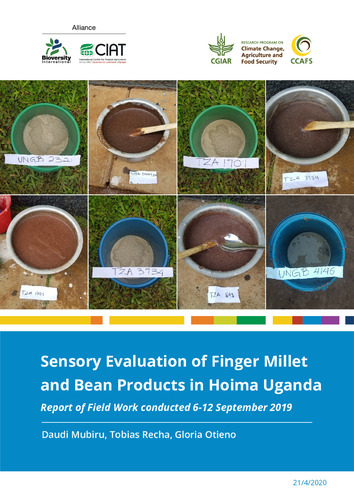Sensory evaluation of finger millet and bean products in Hoima Uganda. Report of field work conducted 6-12 September 2019
Sensory evaluation, also known as organoleptic testing, involves assessing a food product for its aroma, flavour, sensation in the mouth and appearance. This activity was carried out under a project funded by the Netherlands Organization for Scientific Research (NWO) titled Citizen’s Science approach to climate-smart and nutrition-sensitive seed value chains for food and nutrition security in Uganda and Ethiopia. The activity was conducted as a follow up to previous crowdsourcing trials and participatory varietal testing of 34 bean and 43 finger millet varieties by 300 farmers in Hoima, between 2017 and 2019, that identified seven bean and seven finger millet varieties selected by farmers as having most of the attributes needed for adaptation to climate change, including faster maturity, drought resistance, pest and disease resistance and high yields. To gather insights on farmers’ perceptions and preferences regarding taste and acceptability of the selected varieties, a sensory evaluation exercise that engaged 101 farmers (54 men and 47 women) was organized. The invited farmers were asked to taste a variety of local food products prepared from the selected finger millet and bean varieties and provide feedback on taste, texture, consistency, aroma, cooking time, colour and general acceptance. The exercise also aimed at promoting the benefits derived from the consumption of finger millet, especially in weaning infants and provision of important nutrients for lactating mothers. This report provides detailed sensory information about the selected beans and finger millet varieties and their suitability for making different food products.

